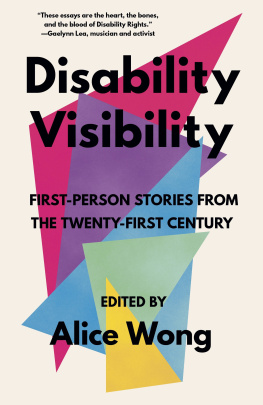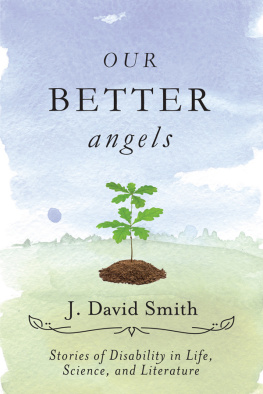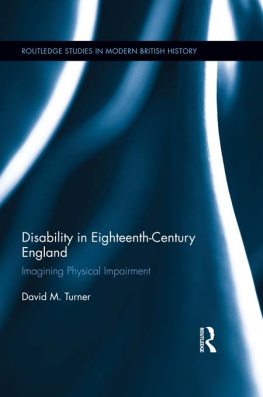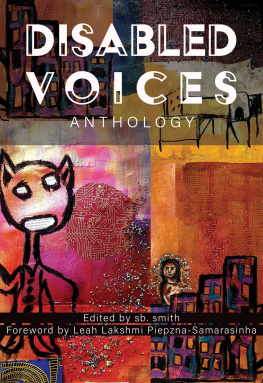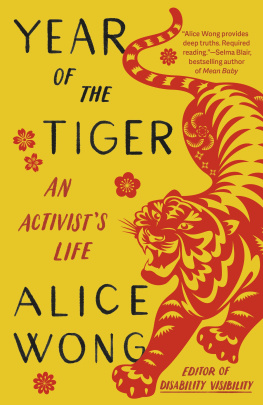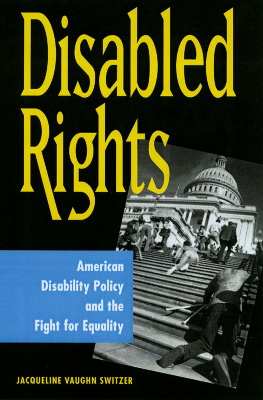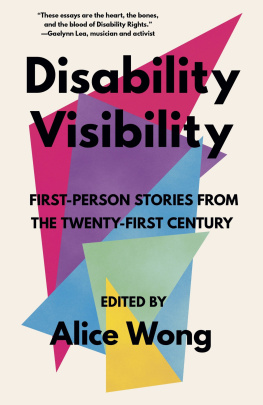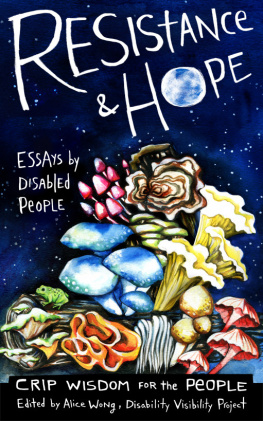Contents
Landmarks
Print Page List
About the Contributors
A. H. Reaume is a feminist activist and writer whose life was changed by a head injury in 2017. Since then, writing can be painful for her, but she continues to write in order to ensure her voice and other disabled voices are heard. Reaume is a columnist for Open Book and finished writing her first book Unfinished: A Novel in 2019. She can be found on Twitter at @a_h_reaume or on her website ahreaume.com.
Alice Sheppard creates movement that challenges conventional understandings of disabled and dancing bodies. Engaging with disability arts, culture, and history, Alice attends to the complex intersections of disability, gender, and race. Alice is the founder and artistic lead for Kinetic Light, an ensemble working at the intersections of disability, dance, design, identity, and technology. Her writing has appeared in academic journals and The New York Times.
Ariel Henley is a writer in Northern California. She has written about issues related to beauty, equality, human connection, and trauma for outlets like The New York Times, The Washington Post, and The Atlantic. She shares her story in an effort to eliminate the stigma surrounding disfigurement and to promote mainstream inclusion for individuals with physical differences. Her memoir, A Face for Picasso, is forthcoming from Farrar, Straus and Giroux.
Britney Wilson is a civil rights attorney and writer from Brooklyn, New York. She received her BA from Howard University and her JD from the University of Pennsylvania Law School. Her work has been featured in Longreads and The Nation, on HBOs Brave New Voices, and the radio show and podcast This American Life.
Diana Cejas is a pediatric neurologist in Durham, North Carolina. Her essays and opinion pieces have appeared in medical publications including JAMA: The Journal of the American Medical Association and Neurology. Works of creative nonfiction and short stories have appeared or are forthcoming in Catapult, Passages North, and Intima: A Journal of Narrative Medicine, among others. She is on Twitter @DianaCejasMD and blogs at dianacejasmd.com. Currently, she is working on a collection of essays that describe her life as both physician and patient.
Ellen Samuels is an associate professor at the University of WisconsinMadison and author of Fantasies of Identification: Disability, Gender, Race (NYU Press, 2014). She publishes critical and creative writing on disability and chronic illness in a variety of forums and is working on a new book called Sick Time: Disability, Chronicity, Futurity.
Hugo and Aurora awardwinning editor Elsa Sjunneson is a deafblind hurricane in a vintage dress. Her nonfiction editorial work has appeared in Uncanny Magazine and Fireside Magazine. As an author, her work has appeared in CNN Opinion, Tor.com, The Boston Globe, and numerous other venues. In addition to editorial and authorial pursuits, she educates authors on writing disability respectfully. She traverses the world with her guide dog and a healthy amount of skepticism.
EugeneGrant is a writer and activist in the dwarfism and disability communities.
The first Deafblind person to graduate from Harvard Law School, Haben Girma advocates for equal opportunities for people with disabilities. President Obama named her a White House Champion of Change. She received the Helen Keller Achievement Award and a spot on the Forbes 30 Under 30 list. President Bill Clinton, Prime Minister Justin Trudeau, and Chancellor Angela Merkel have all honored Haben. Haben believes disability is an opportunity for innovation. She travels the world teaching the benefits of choosing inclusion, and in 2019 she published her first book, Haben: The Deafblind Woman Who Conquered Harvard Law.
Harriet McBryde Johnson was a disability activist, lawyer, and writer who lived most of her life in Charleston, South Carolina. Her articles for The New York Times Magazine, her memoir Too Late to Die Young, and her young adult novel Accidents of Nature demanded that readers look not at her, but through her eyes, as she challenged stereotypes about the disability experience and the worth of disabled lives.
The Harriet Tubman Collective is a collective of Black Deaf and Disabled organizers, community builders, activists, dreamers, and lovers striving for radical inclusion and collective liberation.
A graduate of Sonoma State University, Jamison Hill has written essays for The New York Times, The Washington Post, Mens Journal, the Los Angeles Times, Writers Digest, Vox, and Vice. Jamison was featured in Forgotten Plague, a documentary about myalgic encephalomyelitis, a devastating multisystem disease, as well as a Netflix original series about mysterious diseases. In 2019, Jamisons New York Times essay, Love Means Never Having to SayAnything, was adapted for WBUR Bostons Modern Love podcast and read by Pedro Pascal (Game of Thrones and Narcos). Jamison was also featured on Dax Shepards Armchair Expert podcast.
Jen Deerinwater, a citizen of the Cherokee Nation of Oklahoma, is a bisexual, Two-Spirit, multiply disabled journalist and organizer who covers the issues her communities face with an intersectional lens. She is a contributor at Truthout, founder and executive director of Crushing Colonialism, and a Freedomways Reporting Project fellow. Jens work can be found in publications such as Bitch, Rewire.News, and In These Times. Her work is included in the anthologies Two-Spirits Belong Here and Sacred and Subversive. She has been interviewed for numerous outlets on her work, and The Advocate named Jen a 2019 Champion of Pride.
Jeremy Woody was born in Omaha, Nebraska, and found out that he was profoundly Deaf when he was two years old, after which he learned to use American Sign Language. He attended the Iowa School for the Deaf until eighth grade, then moved to Georgia, where he was mainstreamed. He raced in National BMX races for more than seventeen years, from the time he was ten years old; he was the only Deaf competitor in the United States. He can be found on Twitter @2017JWoody and on Instagram @bmxcrazed67.
Jessica Slice is a writer living in Durham, North Carolina, with her husband, David, her son, Khalil, and their sleepy dog, Batman. She graduated from Davidson College and Columbia University, where she earned a masters degree in social work. She is an advocate for quality mental health care for people with disabilities and for accessibility in higher education. She is at work on a memoir about acquired disability, pain, transracial adoption, and motherhood.
Jillian Weise is a poet, performance artist, and disability rights activist. She is the author of three poetry collectionsThe Amputees Guide to Sex, The Book of Goodbyes, Cyborg Detectiveand a novel, The Colony, which features Charles Darwin and Peter Singer as characters. Weise invented the word tryborg to name nondisabled people who theorize about cyborgs without any ontological experience. She performs Tipsy Tullivan across social media. Her essays have appeared in A Public Space, Granta, Narrative Inquiry in Bioethics, The New York Times, and Tin House.
June Eric-Udorie is a twenty-year-old British writer and feminist activist. She is a cofounder of Youth for Change, an initiative that works to combat female genital mutilation and forced marriage around the world, and her advocacy has taken her to classrooms, the Southbank Centres Women of the World Festival, and the United Nations. Her writing has appeared in

